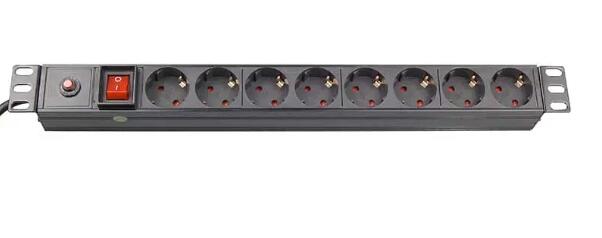The main difference between basic PDUs (Power Distribution Units) and intelligent PDUs lies in their functionality and features. While both types serve the purpose of distributing power to multiple devices from a single source, intelligent PDUs offer additional capabilities and monitoring features that basic PDUs lack. Here's a breakdown of the key differences:
Basic PDUs:
Power Distribution: Basic PDUs are straightforward devices designed to distribute power from a single input to multiple outlets. They do not have advanced features for remote control or monitoring.
Outlet Control: Basic PDUs do not provide individual outlet-level control, meaning you cannot remotely turn individual outlets on or off.
Monitoring: Basic PDUs typically lack monitoring capabilities, so you cannot track power consumption, current load, or environmental conditions like temperature and humidity.
Remote Management: These PDUs do not support remote management, so you cannot access or control them over the network.
Simple Design: Basic PDUs are often more cost-effective and have a simpler design without additional electronics or network connectivity.

Intelligent PDUs:
Power Distribution: Intelligent PDUs also distribute power to multiple outlets from a single input, but they often come with a more robust and flexible design.
Outlet Control: Intelligent PDUs allow individual outlet-level control, enabling remote power cycling and managing devices independently.
Monitoring: One of the key features of intelligent PDUs is the ability to monitor power consumption, current draw, voltage, and other parameters at the outlet level. This data can be essential for capacity planning, energy optimization, and identifying potential issues.
Remote Management: Intelligent PDUs support remote management and can be accessed and controlled over a network. They may offer web interfaces, SNMP (Simple Network Management Protocol) support, or other management options.
Environmental Monitoring: Many intelligent PDUs come with built-in environmental sensors to monitor factors like temperature and humidity within the rack or cabinet.
Alarms and Alerts: Intelligent PDUs can send alerts and notifications based on pre-defined thresholds or events, helping administrators quickly respond to power or environmental issues.
Energy Efficiency: With monitoring capabilities, intelligent PDUs can contribute to energy-efficient operations by identifying power-hungry devices or underutilized outlets.

Intelligent PDUs are often used in data centers, server rooms, and other critical environments where remote monitoring, control, and management are essential for efficient operations and minimizing downtime. Basic PDUs, on the other hand, are more commonly used in situations where remote control and monitoring are not necessary, such as some basic office setups. The choice between the two types depends on the specific needs and requirements of the user or organization.
Newsunn can customize both types of PDU according to your specific requirements. Just send your inquiry to sales1@newsunn.com !
Post time: Jul-21-2023

